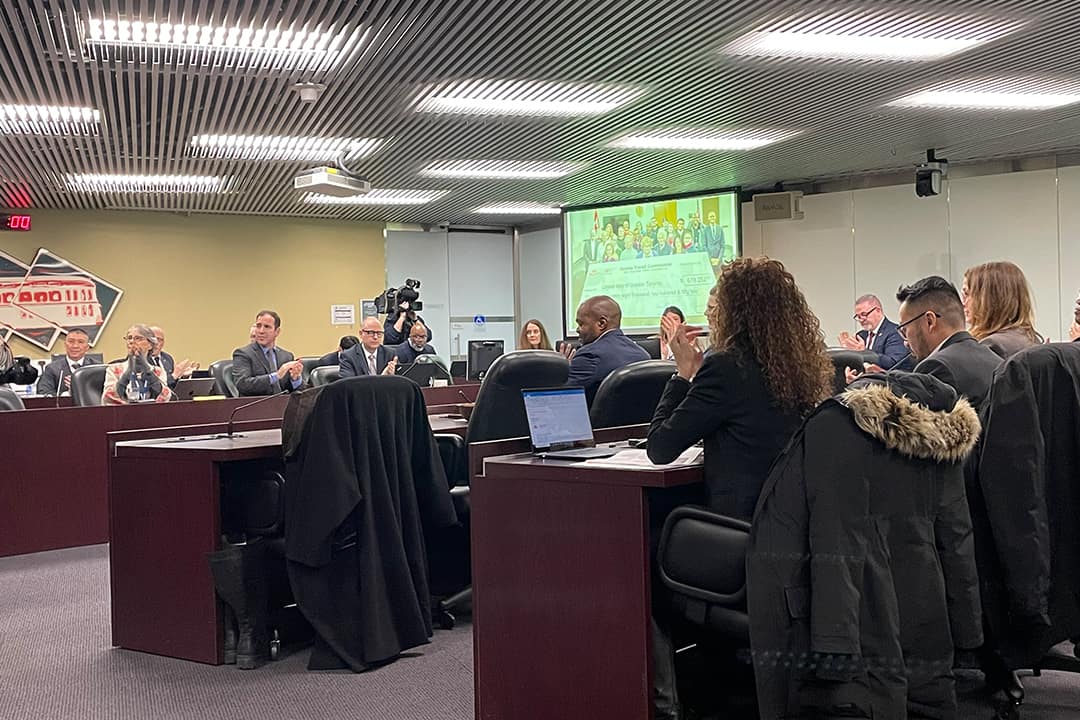During its January 25 meeting — the first board meeting of the new year — the Toronto Transit Commission (TTC) board announced further delays to its busway project. This project is intended to provide support for Scarborough residents — and many UTSC students — after the TTC permanently closed Line 3, the Scarborough Rapid Transit system (SRT), following a derailment in July.
With the majority of UTSC students commuting to campus, the Scarborough Campus Students’ Union (SCSU) has called on the TTC board to prioritize getting the busway built. To meet students’ needs, the union also hopes to implement a universal pass or shuttle bus that would cut down on students’ commute time and costs.
Delays and rising price tag
The TTC Board moved a motion in 2021 to prepare a roadway for buses — the famed busway — built over the tracks of the former SRT corridor that goes from Kennedy to Scarborough Centre. However, by the January 25 meeting, the TTC had failed to finish much of the foundational construction work that the board had expected it to complete, leading to months more of further delays.
In response to this, TTC Board Chair Jamaal Myers moved a motion toward the end of the January meeting requesting TTC Chief Executive Officer Richard Leary report back to the board on financial possibilities for the busway. Leary will report to the board about reallocating $15.2 million in funds from within the TTC’s Capital Budget to ensure the project progresses and whether the provincial government would stomach some of the costs.
“This motion keeps the process going so there would be no further delays,” Myers told the board. “No final decisions are being made at this meeting; it is essentially a report back for the next meeting.”
The TTC plans to begin construction for the busway in 2025. The expected completion date has been pushed from 2026 to 2027 and the expected cost has increased from $92.2 million to more than $108 million, according to a supplementary report the board received from the TTC’s chief capital officer at the meeting. The report attributed the ballooning price tag and delays to an additional, unexpectedly required environmental assessment for the Ministry of Environment, Conservation, and Parks and the need to construct a protective barrier separating the potential TTC corridor from the GO rail line.
Toronto Mayor Olivia Chow’s draft 2024 budget, which she released on February 1, includes full funding for the busway replacement project. Advocacy group TTCRiders had drafted a letter available on their website, calling on the City to provide full funding for the busway if the provincial government neglects to chip in. TTCRiders Executive Director Shelagh Pizey-Allen thinks that the petition was vital not only for the implementation of the busway, but for Chow’s decision to chip in as well.
“The busway would not be happening without TTCRiders,” Pizey-Allen noted in an interview with The Varsity. “It’s bittersweet, right? We’re so relieved that the funding is here now, but we should never have been in the situation where there is such a long gap in transit service.”
Pizey-Allen believes that Chow’s leadership has been important for the construction of Line 3, stating that the mayor has “cleaned up the mess of the last administration.”
The City Council will vote on the proposed budget on February 14.
How are students coping?
UTSC houses less than 10 per cent of its students, with most students commuting to campus. A 2019 survey of students attending Toronto postsecondary institutions — including U of T — found that 60 per cent of students’ trips between home and campus involved local or regional transit.
Students have attempted to make the most out of the current situation since the SRT closed. Andre Zhang — a first-year management and international business student at UTSC and novice representative for the Hart House Debate club — sees the bright red and blue seats of the TTC quite regularly. Zhang takes the 38, one of the current Line 3 replacement services, to head back home at night after late debate meetings.
“Previously, the trip from downtown would require a connection at Kennedy [Station]… now, especially late at night, I can just take the 38 straight from Kennedy,” he told The Varsity. The new route cancels out a transfer at Scarborough Centre for Zhang, compensating for the extra time that the bus takes on the road.
Other students, however, have raised concerns about the continuous neglect that Scarborough transportation receives — concerns they have brought up to the SCSU.
“Students have been sharing their frustrations with the overall service the TTC provides,” SCSU Vice President External Khadidja Roble wrote in an email to The Varsity. “Every day that the busway remains unbuilt, commuter students lose a substantial 20 minutes stuck in traffic. It is imperative that government officials prioritize swift action to prevent further time wastage for our students and all commuters while deliberating on the funding for the busway.”
Roble wrote that the SCSU has worked to address these issues by signing the TTCRiders’ advocacy letter. She added that the union has also “been providing students free PRESTO cards” to offset financial burdens.
The SCSU remains in talks with the university to implement a universal transit pass — a pass that would provide UTSC students with free or discounted public transit trips. Roble told The Varsity that Metrolinx “appears to be supportive of the project.” As for the potential of a shuttle bus project similar to that provided between the UTM and UTSG campuses, the union is in the “early stages” of developing a proposal, alongside the TTC, that would provide direct transportation from Kennedy Station to UTSC.
The next TTC board meeting is scheduled for February 22, where Leary will report back to the board about the state of the budget and whether the province will step in to foot some of the costs.



No comments to display.